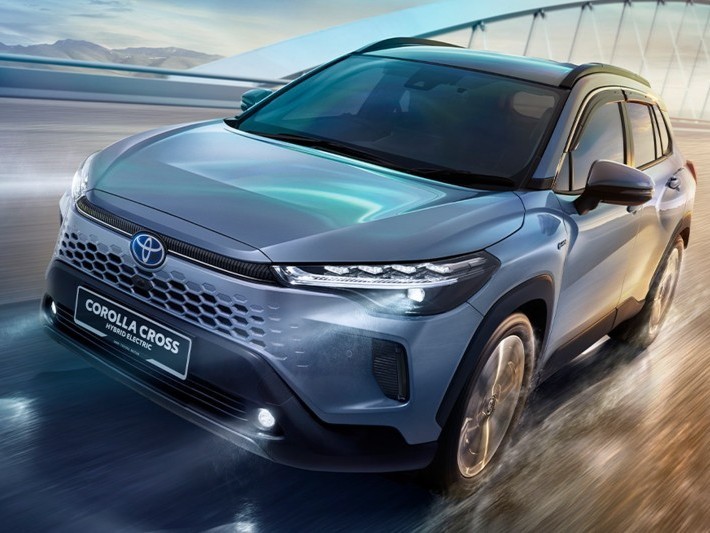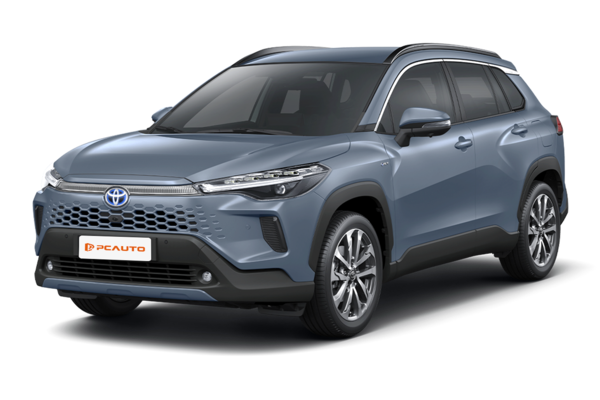Q
when toyota corolla cross launch in malaysia
So, why does the Suzuki Jimny come with a heftier price tag in Malaysia? Let's break it down. First off, it's all about its unique niche and market demand. As a compact hardcore off-roader, the Jimny rocks professional off-road hardware like a body-on-frame construction and three-link rigid axle suspension – stuff you don't see every day in this segment, which naturally bumps up production costs. Then there's the whole import tax and consumption tax situation in Malaysia; those duties add a pretty penny to the final price. On top of that, supply of the Jimny here is pretty tight, and when demand outstrips supply, prices tend to stay elevated.
But here's the thing – the Jimny might be small, but it's a serious off-road weapon. That ALLGRIP PRO part-time 4WD system and LSD limited-slip differential? Those are proper off-road kit that add real value. For Malaysian buyers, another plus is the Jimny's strong resale value, which actually makes its long-term ownership costs more appealing. And let's not forget how well it suits our local roads – whether you're navigating city traffic or heading out for a weekend adventure, it handles it all. So yeah, it's pricier, but when you factor in its uniqueness, off-road chops, and legendary durability, the Jimny still makes a solid case for itself.
Special Disclaimer: This content is published by users and does not represent the views or position of PCauto.
Related Q&A
Q
What is the wheelbase of the Toyota Corolla cross?
The Toyota Corolla Cross has a wheelbase of 2,640mm, which is slightly above average for its class of SUVs. This gives it a relatively spacious rear legroom while still keeping things nimble enough for city driving. Since wheelbase is one of the key factors in determining cabin space, it directly impacts passenger comfort and boot capacity—making the Corolla Cross a practical choice for daily family use or longer trips.
That said, vehicles with longer wheelbases tend to feel more stable at higher speeds but can have a slightly wider turning radius. Toyota’s engineers have tuned the chassis to strike a balance between these two traits. Built on the TNGA platform, the Corolla Cross also benefits from improved body rigidity and smarter space utilization, so that 2,640mm wheelbase works harder than the number might suggest.
Just keep in mind that wheelbase alone doesn’t tell the whole story—ground clearance, overall width, and even how efficiently a brand uses its wheelbase can affect real-world space. If you’re comparing options, a test drive is still the best way to judge.
Q
Is the 2023 Corolla Cross a good car?
The 2023 Corolla Cross is a well-rounded compact SUV that ticks all the right boxes for daily family use, backed by Toyota's reputation for reliability and practical design. It offers either a 1.8L naturally aspirated engine or a hybrid powertrain—both deliver solid fuel efficiency, with the hybrid notably cutting city driving costs while keeping maintenance affordable.
Inside, you’ll find flexible cabin space and a trunk that handles family trips with ease. Standard Toyota Safety Sense packs features like pre-collision alerts and lane-keeping assist, adding peace of mind on the road. The interior keeps things functional, with a 9-inch touchscreen supporting Apple CarPlay/Android Auto—right in line with what most buyers expect.
That said, don’t expect thrilling acceleration; the power delivery leans smooth rather than punchy, making it better suited for relaxed commutes. On the resale front, Toyotas generally hold their value well, but it’s worth cross-shopping rivals in this price range. Take it for a test drive to see if the suspension tuning and cabin noise levels match your preferences, and always double-check the dealer’s warranty fine print before signing.
Q
What is the safety rating of the Toyota Corolla 2021?
The 2021 Toyota Corolla excels in safety performance and has earned recognition from several international authoritative bodies. For instance, it achieved a five-star rating in Euro NCAP testing and was named a "Top Safety Pick" in IIHS crash tests in the United States. This model comes standard with the Toyota Safety Sense 2.0 active safety system, which includes features like a pre-collision system, lane departure alert, adaptive cruise control, and automatic high beams, providing comprehensive safety protection for drivers. In addition, the Corolla's body structure uses high-strength steel, effectively enhancing its impact resistance, and it is equipped with multiple airbags to further ensure passenger safety. For consumers considering purchasing this car, its safety performance is an important plus. Similar safety configurations in competing models are gradually becoming industry standards, indicating that automakers are placing increasing importance on safety performance. Consumers can pay more attention to these details when choosing a vehicle to ensure the driving safety of themselves and their families.
Q
Is the 2021 Corolla a good first car?
The 2021 Corolla makes a solid first car. It’s reliable, gets good gas mileage, and is super easy for new drivers to handle. Under the hood, you’ve got either a 1.8L or 2.0L naturally aspirated engine—smooth and built to last—paired with a CVT transmission that makes daily commuting a breeze while keeping fuel costs down. It also comes standard with Toyota Safety Sense, which includes pre-collision warning, lane keep assist, and adaptive cruise control—all stuff that really helps boost safety on the road. The interior is simple and functional, with decent space that works well for small families or singles. Maintenance costs are pretty reasonable too, and parts are easy to find, so owning it long-term is low-stress. If you want a bit more pep, the 2.0L version has quicker acceleration. It holds its value better than most in its class too, so you won’t take as big a hit when it’s time to trade up. Compared to other compact cars out there, it’s just really well-rounded—no major weaknesses. All in all, it’s a really safe bet for an entry-level ride.
Q
What kind of engine does the 2021 Corolla have?
The 2021 Corolla offers a range of engine options depending on the trim and configuration. The most common ones are the 1.8-liter and 2.0-liter four-cylinder naturally aspirated engines. The 1.8L puts out 139 horsepower, paired with a CVT transmission, and it's all about being economical and practical—perfect for daily commuting. Then there's the 2.0L, which cranks out 169 horsepower, delivering better performance for folks who want a more engaging driving experience. Some markets also get a 1.8L hybrid version that combines a gas engine with an electric motor for even better fuel economy.
Tech-wise, all these engines feature Dual VVT-i variable valve timing, which helps optimize fuel efficiency and power delivery. They're also known for being pretty reliable and durable, with relatively low maintenance costs. If you're thinking about buying a Corolla, pick the powertrain that fits your budget and needs. The 1.8L is great if saving gas is your top priority, the 2.0L suits drivers after more zip, and the hybrid can cut down on fuel costs even more over the long haul.
Q
What is the maintenance on a 2021 Toyota Corolla?
The regular maintenance for the 2021 Toyota Corolla mainly involves changing the engine oil and oil filter every 10,000 kilometers or 6 months, whichever comes first—this is the foundation for ensuring the engine runs smoothly over the long haul. The air filter should be inspected or replaced every 20,000 kilometers, and the cabin air filter is recommended to be changed annually or every 20,000 kilometers to keep the interior air quality fresh. Brake fluid needs replacing every 40,000 kilometers or 2 years. For CVT models, the transmission fluid should be checked every 80,000 kilometers and replaced if necessary, while spark plugs typically need swapping out at 100,000 kilometers. Also, regularly checking tire pressure, brake pad thickness, and the tightness of chassis bolts is crucial—these little details boost driving safety and cut down on long-term repair costs. It’s worth noting that as a globally best-selling model, the Corolla has relatively affordable maintenance costs, with plenty of original parts available and many third-party repair shops familiar with its structure, so owners can choose between original factory service or reputable third-party options based on their budget. If you want to further extend the vehicle’s lifespan, it’s advisable to get a comprehensive inspection every 50,000 kilometers, including the suspension system and drivetrain components. This helps spot potential issues early and avoids bigger losses down the line.
Q
How much is insurance on a 2021 Toyota Corolla?
The insurance cost for a 2021 Toyota Corolla typically ranges from RM1,500 to RM3,500 per year. The exact amount depends on factors such as the vehicle model, engine displacement, type of insurance coverage, and the owner's personal circumstances. Comprehensive insurance premiums are higher than third-party insurance. Key factors affecting premiums include the owner's age, driving record, vehicle usage location, and selected insurance add-ons. For example, younger owners or those living in accident-prone areas may need to pay higher premiums. To get a more accurate quote, it is recommended to enter specific information on the insurance company's official website or through an agency platform for calculation, and also compare the preferential schemes of different insurance companies. In addition, it is important to understand the deductible and claim scope in the insurance terms, as these details directly affect the actual compensation amount when making a claim. Regularly reviewing the insurance policy and adjusting the insured amount according to vehicle depreciation can help owners control insurance costs more reasonably in long-term use.
Q
How much does a battery cost for a 2021 Toyota Corolla?
The battery price for a 2021 Toyota Corolla typically ranges from RM500 to RM1000, depending on the battery type and brand. Original equipment (OE) batteries are more expensive but come with a longer warranty, while third-party brands like Amaron or Bosch offer better value for money with shorter warranties. It's recommended to choose a maintenance-free battery (MF battery) that meets the vehicle's specifications. These batteries don't require regular water refills and have a longer lifespan, usually 2 to 3 years. When replacing the battery, pay attention to specifications such as capacity (Ah) and cold cranking amps (CCA) to ensure compatibility with the vehicle's electrical system. Additionally, regularly checking the cleanliness and tightness of battery terminals helps extend battery life. If the vehicle is parked for an extended period, it's advisable to start it once a week to maintain battery charge. Choosing a reputable repair shop or authorized service center for battery replacement ensures quality installation and access to professional testing services.
Q
How long does a 2021 Corolla battery last?
The battery life of a 2021 Corolla typically ranges from 3 to 5 years, depending on usage habits and maintenance. If you often take short trips or leave it parked for long periods, the battery will wear out faster. Regularly checking the electrolyte level and keeping the terminals clean helps extend its life. Climate is also a big factor—hot weather speeds up battery aging, so it’s advisable to get a professional check every two years. Besides the original factory battery, there are plenty of high-performance alternatives on the market, like maintenance-free or AGM batteries, which are better suited for vehicles with frequent start-stop systems or added car electronics. In daily use, turning off the air conditioning and lights before shutting off the engine reduces battery strain. If you notice slow starting or the battery warning light on the dashboard comes on, have it checked promptly to avoid getting stranded. Most repair shops offer free battery testing services, making it easy for owners to stay on top of its condition.
Q
How long should a 2021 Toyota Corolla last?
The 2021 Toyota Corolla can typically hit 200,000 to 300,000 kilometers or more with regular maintenance and normal use. Its durability mainly comes down to Toyota's tried-and-true powertrain and solid manufacturing. The 1.8L or 2.0L naturally aspirated engines and CVT transmissions in this model have been market-tested for ages—keep up with regular oil changes, transmission fluid swaps, and other routine maintenance as per the manual, and those mechanical parts will hang in there a lot longer.
Day-to-day, pay extra attention to the cooling and ignition systems. If you're in a hot climate, shorten the coolant replacement interval, and if you mostly do short trips, keep an eye on the battery. For rust protection, the factory does a basic job, but coastal owners might want to add a chassis undercoat. Worth noting: the hybrid version, with its reduced engine load, could theoretically have an even longer-lasting powertrain.
At the end of the day, how long the car lasts depends a lot on how you drive and take care of it. Aggressive driving or constant overloading will wear things out faster, but smooth driving and sticking to the maintenance schedule will maximize its lifespan. On the used car market, Corollas with complete service records usually hold their value well—another sign of their long-term reliability.
Popular Cars
Model Year
Car Compare
Car Photo
Latest Q&A
Q
Do I need an alignment after rotation?
Whether a four-wheel alignment is needed after tire replacement depends on the actual condition of the vehicle. If only the tires are replaced and the vehicle has been driving normally without deviation, steering wheel vibration, or uneven tire wear, a four-wheel alignment is usually not required immediately, but wheel balancing must be performed to ensure stability when the wheels rotate at high speeds. However, if problems such as directional deviation, reduced steering precision, misaligned steering wheel, or abnormal tire wear (e.g., one-sided wear) occur after tire replacement, four-wheel alignment is necessary to adjust the geometric parameters of the suspension system (including caster angle, front wheel camber, etc.), thereby restoring the vehicle's straight-line driving stability and uniform tire contact with the road. Moreover, if chassis component repairs (such as suspension or steering system) are involved during tire replacement or the vehicle has been in a collision, four-wheel alignment becomes an essential step, as it can effectively reduce abnormal tire wear, improve handling safety, and lower fuel consumption. It is recommended to check the alignment parameters regularly every 20,000 kilometers or once a year. If you frequently encounter rough road conditions (such as curbs or speed bumps) during daily driving, the inspection interval should be shortened accordingly. Professional technicians can measure the data using specialized equipment and compare it with the manufacturer's specifications to determine whether adjustments are needed.
Q
Is it okay to rotate tires every 10,000 km?
Rotating tires every 10,000 kilometers is a reasonable and necessary maintenance measure, especially for fuel vehicles, as this frequency can effectively balance the wear difference between front and rear tires. Tire rotation involves regularly adjusting the installation positions of tires (e.g., moving front tires to the rear), which ensures more uniform wear across all tires, thereby extending the overall service life by approximately 20%-30%. For fuel vehicles, it is recommended to rotate tires every 10,000 kilometers, while for new energy vehicles, due to their greater weight and stronger torque output, the interval should be reduced to 8,000 kilometers. During rotation, the cross-rotation method should be employed (i.e., moving front tires to the opposite rear positions), and tire pressure should be checked simultaneously to ensure it meets the specified standards (2.3-2.5 bar for fuel vehicles, with an additional 0.2 bar for new energy vehicles). It is important to note that if a tire exhibits abnormal unilateral wear, bulges, or tread depth below 1.6 millimeters, simple rotation is not recommended and the tire should be replaced immediately. Regular monthly tire pressure checks and removal of debris from treads can further enhance tire performance and safety.
Q
What happens if you don't rotate tires?
If tire rotation is not performed regularly, it will lead to uneven tire wear, which in turn causes multiple problems. For front-wheel-drive vehicles, the front tires bear both driving and steering functions, so their wear rate is significantly faster than that of the rear tires; for rear-wheel-drive vehicles, since power is concentrated on the rear tires, the rear tires wear more noticeably. Long-term failure to rotate tires will shorten the overall tire life by 20%-40%—the front tires may be scrapped prematurely while the rear tires remain relatively new, resulting in resource waste. In addition, uneven wear reduces traction, particularly on wet surfaces, which can easily lead to skidding or a 10%-15% increase in braking distance, thereby elevating driving risks. Irregular wear also exacerbates tire noise and increases fuel consumption by 0.3-0.8 liters per 100 kilometers due to uneven rolling resistance. It is recommended to rotate tires every 10,000 to 15,000 kilometers. For front-wheel-drive vehicles, the cross-rotation method should be employed (left front to right rear, right front to left rear), while for rear-wheel-drive vehicles, the rear tires need to be crossed to the front. After rotation, tire pressure (the standard value typically ranges from 2.3 to 2.6 bar) should be verified and wheel balancing performed to prevent high-speed vibrations. If the tires exhibit irregular wear patterns or the tread depth falls below 1.6 mm, they should be replaced immediately. Regular tire rotation not only prolongs tire lifespan but also enhances fuel efficiency and driving safety. The cost of a single rotation is approximately 50 to 100 ringgit, substantially lower than the expense of premature tire replacement.
Q
Is it good to rotate car tires?
Tire rotation is an important maintenance measure to ensure even tire wear and extend service life. It is recommended to perform it every 5,000 to 10,000 kilometers or when uneven wear is detected. For front-wheel drive vehicles, the front tires wear faster as they handle steering and braking tasks, so they need to be cross-rotated with the rear tires (left front to right rear, right front to left rear). For rear-wheel drive vehicles, the rear tires should be diagonally swapped with the front tires to balance the wear of the drive wheels. If the tires have a directional tread pattern or asymmetric design, the rotation direction must be maintained, and only front-to-rear swaps on the same side are allowed to avoid affecting handling on wet and slippery roads. After rotation, the tire pressure should be adjusted to the standard for the corresponding wheel position, and it is recommended to perform dynamic balancing and four-wheel alignment simultaneously to optimize driving stability. Note that snow tires or studded tires cannot be rotated, and tires with different front and rear sizes can only be swapped left and right. Regular rotation can reduce abnormal wear (such as uneven wear or wavy patterns), improve grip and driving quietness, reduce safety hazards caused by tire problems, and save replacement costs in the long run. The specific operation should be based on the vehicle manual. If there is a lack of guidance, the cross-rotation method for bias-ply tires or the same-side rotation method for radial tires can be prioritized.
Q
How often should car tyres be rotated?
The replacement cycle of car tires should be determined by comprehensively considering factors such as service life, mileage, driving habits, and environmental conditions. Generally, it is recommended to replace them every 3 to 5 years or after 60,000 to 80,000 kilometers of driving, whichever comes first. As rubber products, tires deteriorate over time. Even if the mileage threshold hasn't been reached, immediate replacement is necessary when sidewall cracks, bulges appear, or tread depth falls below 1.6 mm (verifiable with a coin test) to ensure safety. Due to their heavier weight and stronger torque output, new energy vehicles experience accelerated tire wear. It is advisable to shorten the inspection interval to every six months, with urban commuting replacement mileage typically ranging from 42,000 to 56,000 kilometers. Regular tire rotation helps distribute wear evenly. For front-wheel-drive vehicles, front-to-rear rotation every 8,000 to 10,000 kilometers is recommended, while for new energy vehicles with higher front axle loads, this interval can be reduced to 6,000 to 8,000 kilometers. Additionally, maintaining cold tire pressure at 2.3 to 2.5 bar (add 0.2 bar for new energy vehicles) and avoiding aggressive maneuvers like rapid acceleration and hard braking can extend tire lifespan by 15% to 20%. Tires exceeding 6 years from their production date (identifiable via the DOT code on the sidewall) should be replaced regardless of apparent condition.
View MoreRelated News

Should I choose the top-tier Toyota Corolla Cross, or the entry-level Fortuner?
Kevin WongNov 6, 2025

The Tiggo 7 PHEV, conversely, gains traction among younger buyers by offering a lower price point and a more technologically advanced package.
JamesOct 15, 2025

Toyota Corolla Cross mid-term facelift in China, featuring a new front face and interior design
AshleySep 29, 2025

Toyota Corolla Cross Design Revealed: A Versatile Model Combining Practicality and Comfort
AshleyJul 16, 2025

Toyota Unveils All-New Corolla Cross, Introduces GR SPORT Trim for the First Time
JohnMay 8, 2025
View More


















Pros
Cons